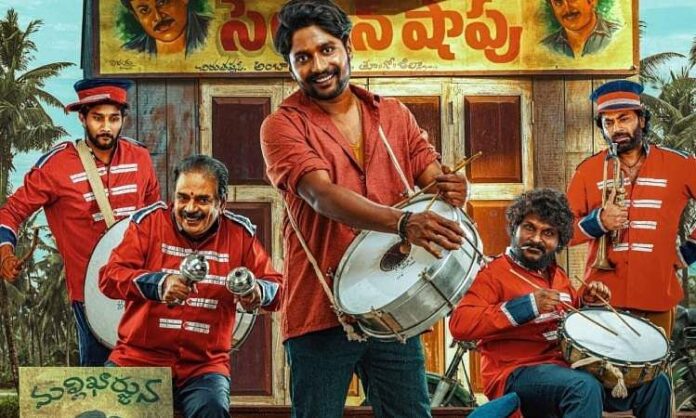In the endless conflict between the haves and the have-nots, playing across the world through the ages, there have always been two solutions presented to the have-nots, to address their plight. One is the path of pacifism. Education. Activism. Another is the path of violence, bolstered by resistance and combat. While the costs of the latter are seemingly high, there is also some level of sustained futility in the former which seems about as passive as death. The results do not seem immediate. And what does not come immediately does not feel as satisfying. Hence we have movie after movie taking the path of violence to tell tales of oppression. Even a film like Asuran (2019) tells that education is important, irreplaceable and most importantly, cannot be snatched or stolen like land. But this only comes towards the end, after dedicating its entire runtime to displaying violence of varying intensity. And then there are films like Vaathi/Sir, which tell in simplistic terms that education is the path from oppression to empowerment. But one fact remains clear, whether you choose violence or peace, neither option feels fully satisfying. But, say, what if there is a third solution, both in life and cinema? One that integrates the best of both worlds? Ambajipeta Marriage Band unpacks this third, more realistic path rather beautifully.
Cast – Suhas, Sharanya Pradeep, Shivani Nagaram, Nithin Prasanna, Jagadeesh Prathap Bhandari, Goparaju Ramanna
Director – Dushyanth Katikaneni
Set in 2007 and based on true events, Ambajipeta Marriage Band (AMB) is centered on two sets of siblings. Venkat (Nithin Prasanna) and Lakshmi (Shivani Nagaram), upper caste folks representing the haves and Malli (Suhas) and Padma (Sharanya Pradeep), playing the opposite. The film seems to be fashioned out of the same cloth Suhas’ previous film Colour Photo (2020) came from. But unlike Colour Photo, which displays a larger class and caste conflict through the prism of skin colour, AMB goes for the jugular, addressing fractured inter-caste dynamics with an explicit, unflinching gaze. This is not typical for your average Telugu film, but a welcome change all the same, despite the Censor Board undoing its raw impact by muting certain words. While Malli and Padma are twins, Venkat and Lakshmi seem to have a significant age gap. Malli and Lakshmi, who always had a soft spot for each other since their childhood, eventually become a couple, dating in secret. On the other hand, Venkat harasses Padma, a schoolteacher. AMB’s conflict is rather straightforward and predictable, but its treatment makes all the difference.
Venkat is one of the trickiest antagonists one has seen in films lately. Despite being the most unadulterated bigot—wearing his hatred and contempt for the lower-caste people on his sleeve and exploiting them to no end—we still keep guessing his motives. When Padma’s dad, a humble barber, goes to Venkat to give a recommendation to make his daughter’s job permanent, he asks the father to send Padma to his place on Sundays for tuition. While you would expect him to use the lessons as an excuse to be downright lecherous, he does not lay a hand on her. What he does instead is let rumours about Padma run amok. She is branded as a harlot by the villagers, with teenage boys trying to peek at her while she is bathing, she also becomes the subject of some objectionable graffiti. Similarly, in another part of the film, when Malli lunges towards Venkat to kill him with a razor, only to fall down, Venkat picks up the razor post-combat…not to kill Malli, but to shave his head. Even when Venkat finds out about Malli and Lakshmi, he does not resort to the usual theatrics one would expect a girl’s older brother to do. Venkat is also a moneylender who controls the entire village through loans that come with exorbitant interest rates. He knows people cannot pay their loans back and yet he continues to give them, so he can control them. In every step of the way, Venkat comes off as a man who would choose humiliation as punishment rather than assault (physical/sexual) and death. In a village, where everyone knows everyone and reputation matters the most, humiliation might just be worse than death.
But what AMB does is enable the lower-caste characters of the film to weaponize humiliation the way its upper-caste characters do. The film also shows that it can be even more effective than the latter considering there is strength in both numbers and solidarity. And in presenting conflict after conflict that uses humiliation as its modus operandi, the film brings forth one argument: One needs to live. So that one can grow strength to protect themselves, protect their loved ones and most importantly, fight against those who jeopardize everything one has got to protect. AMB also has a thing or two to say about dignity. About fighting back. About remembering. All things one can do only when they are alive.
Despite its heavy themes, AMB is packaged like a masala entertainer, especially in its first half. Suhas shines in both the lighter portions where he has to dance and be funny and in the heavier parts where the film leans hard into the social drama genre. Sharanya Pradeep gets the film’s massiest, meatiest role and plays it to perfection. One of this film’s biggest achievements is its cast, where even the actors with the smallest roles leave an impact on the viewer. The touches of melodrama come with restraint, much like the different characters who restrain their urge to slit each other’s throats. At no point does the film come off as jarring and polarising, despite making considerable shifts in tone and treatment. That is quite the testament to its film’s team, behind and in front of the camera, and their attempt to craft a story that is as massy as it is memorable.
#Suhas #Sharanya #shine #effective #drama #twist #Cinema #express

